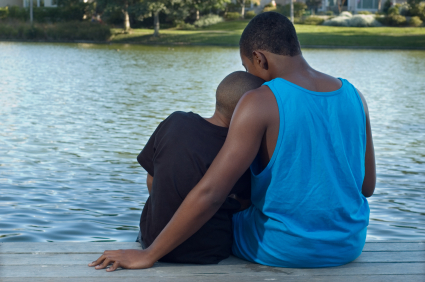

Seeing the suffocating animals in the Gulf is making me want to leave the planet. The picture of the pelican gulping for air on the home page of nytimes.com was enough to give any who saw it a visceral feeling of what it would be like to be coated with oil so that it was impossible to breathe. Where do we put our grief from witnessing such suffering? How do we handle such loss?
Elizabeth Kubler-Ross introduced the five stages of grief as a way to help in the process of recovery from terrible loss. It is quite clear the geyser in the Gulf has me touching all the stages of grief -- except acceptance, the fifth stage.
The first stage of grief is denial. This is the "this can't be happening" stage. I'm right there, every time I think of the photo of the pelican, of the decimation of the Gulf Coast culture, livelihoods and ways of life.
The second stage of grief is anger, and we collectively have plenty of that to go around about this situation. This is the "I can't accept this" stage. Fortunately enough people in the Gulf states have vocalized their anger that more help is being shored up, but the geyser still gushes. Given that I don't live on the Gulf Coast, my anger is a bit more abstract and makes me wish for a complete reckoning for Cheney's secretive energy policies. It is painful to be a human.
So what about the third stage, the bargaining stage? In the case of the catastrophe in the Gulf, with whom do we bargain? The government? Oil companies?
Depression is the hallmark of the fourth stage of grief. I expect we are all dipping in and out of this when we think about the Gulf. After all, the situation brings us face to face with the practice of putting untested and untried enterprises into production without heed of the consequences. The world absolutely needs to practice The Precautionary Principle instead. But will we ever learn?
Acceptance is the fifth stage of recovery from grief. Is it possible to accept the dying birds and ruined marshes?
One person has reached this high pinnacle of grief resolution about environmental degradation and been able to move on productively: the primatologist Jane Goodall. I once heard her speak, and if anybody knows about grief due to humans' impact on the Earth, it must be her. How can she bear it when she hears about her beloved chimpanzee's being slaughtered? How can she stand to hear about the bushmeat trade? When someone in the audience asked her that question, she answered, "I just do the best I can every day."
A friend notes to heed His Holiness the Dalai Lama's words: "Our hearts fill with compassion or bodichitta to move us to alleviate the suffering of all beings. How we each do that is up to us."
Jane Goodall's quote sat on my desk for a number of years. I need to put it back. I must admit I am wavering between stepping up the grief ladder to do the best I can every day, to bringing healing where I can, and wanting to disown humanity. The pain of our wrongs is hard to handle.
Please share how you are coping with your grief about the Gulf disaster. There is no right or wrong about feelings of grief, just that they need to be cared for with compassion.